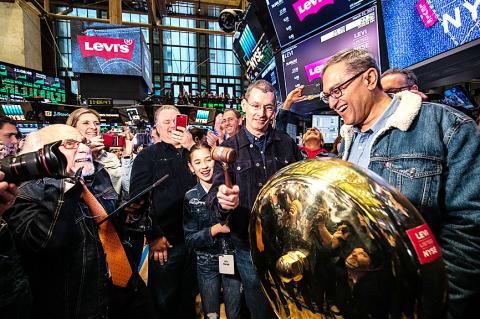Iconic jeans company Levi Strauss & Co on Thursday made a hot return to Wall Street as it eyes international growth and more direct sales to consumers in the fast-changing retail environment.
Listing under the ticker symbol “LEVI,” shares of Levi’s surged at the opening before finishing at US$22.41, up nearly 32 percent above its initial public offering price.
The New York Stock Exchange relaxed its no-denim policy for the session, for which the opening bell was rung by jeans-clad executives from the San Francisco-based company.

Photo: Bloomberg
Levi’s, which went private in 1985, had raised US$623 million in an initial public offering that priced above its initial target price.
CEO Charles Bergh, who joined Levi’s in September 2011 after a lengthy stint at Procter & Gamble Co, told CNBC that the brand faced a “throw-down moment” in 2014 as surging demand for soft “athleisure” pants took market share, especially among women.
The company brought staff from denim mills into its technology development center in San Francisco to address the problem.
“We understood what women were telling us: Wearing tights, that used to be a denim occasion,” Bergh told the network. “They wanted soft, stretchy, comfortable material that made them look great and gave them confidence.”
Engineers developed a more comfortable fabric and one that does not give women “baggy knees, which is their biggest disatisfier” that produced strong sales, Bergh said.
The return to public markets comes as apparel brands face continual churn in the retail landscape in the Amazon.com Inc era.
Just last month, 50-year-old US retailer Gap Inc, which also sells jeans, announced it was splitting into two companies to emphasize its “Old Navy” brand and de-emphasize stores under its namesake company.
Like other major brands such as Nike and Ralph Lauren, Levi’s has sought to make itself present at all major customer meeting points: Amazon and other online vendors; department stores such as Bloomingdale’s; and direct selling, whether at its own retail stores or online.
Bergh told CNBC he plans to use some of the proceeds from the offering to enhance the company’s e-commerce business, build out its brick-and-mortar presence and in general for “continued investment in building out our omnichannel footprint.”
In a securities filing, Levi’s also emphasized potential growth in China and other emerging markets.
Of Levi’s US$5.6 billion in last year’s revenues, more than half came from the Americas, while 29 percent came from Europe and just 16 percent from its “Asia” segment, which also includes the Middle East and Africa.
Levi’s said in the filing that China represents 20 percent of the global apparel market, but just 3 percent of its revenues, a potential growth market for which the company has tapped a new management team.
However, the filing also highlighted “a global trade war” as a risk, citing tariffs imposed by US President Donald Trump on several partners, including China and the EU, which imposed reciprocal tariffs, including on denim products.

Real estate agent and property developer JSL Construction & Development Co (愛山林) led the average compensation rankings among companies listed on the Taiwan Stock Exchange (TWSE) last year, while contract chipmaker Taiwan Semiconductor Manufacturing Co (TSMC, 台積電) finished 14th. JSL Construction paid its employees total average compensation of NT$4.78 million (US$159,701), down 13.5 percent from a year earlier, but still ahead of the most profitable listed tech giants, including TSMC, TWSE data showed. Last year, the average compensation (which includes salary, overtime, bonuses and allowances) paid by TSMC rose 21.6 percent to reach about NT$3.33 million, lifting its ranking by 10 notches

SEASONAL WEAKNESS: The combined revenue of the top 10 foundries fell 5.4%, but rush orders and China’s subsidies partially offset slowing demand Taiwan Semiconductor Manufacturing Co (TSMC, 台積電) further solidified its dominance in the global wafer foundry business in the first quarter of this year, remaining far ahead of its closest rival, Samsung Electronics Co, TrendForce Corp (集邦科技) said yesterday. TSMC posted US$25.52 billion in sales in the January-to-March period, down 5 percent from the previous quarter, but its market share rose from 67.1 percent the previous quarter to 67.6 percent, TrendForce said in a report. While smartphone-related wafer shipments declined in the first quarter due to seasonal factors, solid demand for artificial intelligence (AI) and high-performance computing (HPC) devices and urgent TV-related orders

Prices of gasoline and diesel products at domestic fuel stations are this week to rise NT$0.2 and NT$0.3 per liter respectively, after international crude oil prices increased last week, CPC Corp, Taiwan (台灣中油) and Formosa Petrochemical Corp (台塑石化) said yesterday. International crude oil prices last week snapped a two-week losing streak as the geopolitical situation between Russia and Ukraine turned increasingly tense, CPC said in a statement. News that some oil production facilities in Alberta, Canada, were shut down due to wildfires and that US-Iran nuclear talks made no progress also helped push oil prices to a significant weekly gain, Formosa said

MINERAL DIPLOMACY: The Chinese commerce ministry said it approved applications for the export of rare earths in a move that could help ease US-China trade tensions Chinese Vice Premier He Lifeng (何立峰) is today to meet a US delegation for talks in the UK, Beijing announced on Saturday amid a fragile truce in the trade dispute between the two powers. He is to visit the UK from yesterday to Friday at the invitation of the British government, the Chinese Ministry of Foreign Affairs said in a statement. He and US representatives are to cochair the first meeting of the US-China economic and trade consultation mechanism, it said. US President Donald Trump on Friday announced that a new round of trade talks with China would start in London beginning today,